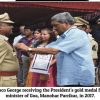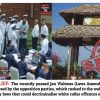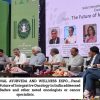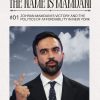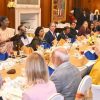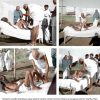Goa is abuzz with excitement as vintage bike and car owners, users, collectors and fans are decking […]
ONLY DEEP POCKETS CAN SUSTAIN YOU
Jan 18- Jan 24 2020, Stray Thoughts January 17, 2020For a change I have decided to devote Stray Thoughts this week to the story of my life. My days of poverty, my passion for journalism, the various newspapers and magazine I have been with and why I think coming to Goa and subsequently starting the Goan Observer was a mistake. Goans do not have the guts to support an opposition paper and defy a party which is harassing the minorities and the tribal population of Goa…
BY RAJAN NARAYAN
AND a few stray thoughts for yet another Saturday. For a Saturday following the week when I decided to start writing pieces of my autobiography at the instance of my wife Tara Narayan. I was born in a very poor family. I managed to go to school only because I got a scholarship. The only consolation was that it was a Convent school run by the Jesuits who specialized in running educational institutions including St Xavier’s in Goa. The only ambition my father, a lower division clerk in the army had for his children, was they should get government jobs. Most of the time because he could not get along with my mother he used to get himself transferred to other cities and states. He used to send very little money for running a household of four children.
CLERK TURNED MBA
The eldest child was my sister who had to take up a job as a teacher at the age of 18, immediately after she passed school with a school leaving certificate, to support the family. Next was my brother who worked as a clerk in the sorting office of the Post Office on night shift. With the money he earned he enrolled for a 5-year course in textile technology in the best engineering college in Bengaluru. I arrived seven years later and was followed by a sister who came seven years later then me. Even with my elder sister’s earnings and a couple of hundreds that my father sent to us was not enough for my mother to make ends meet.
Virtually every month we were pawning household vessels to buy basic necessities. Now it has become fashionable to eat jowari, ragi and other cheap grain roti. Now these roti or chapatti are considered healthy, what the poor people ate or eat even today. But we, the poor had no choice but to eat ragi which was the cheapest grain available in the ration ship. We also bought wheat and rice though the rice was full of grit and stones. Hours were spent in removing the grit and stones from the rice we got. It was simpler to eat “lapsy” which was boiled cracked wheat – yet another item now considered health food.
RICH NOW EAT RAGI
So today when my upper class wife and rich friends keep telling me to eat “nachne” I tell them that I cannot stand them because I ate it for almost 20 years out of hungry necessity. When I entered 8th standard in school to which I used to walk 10 kilometers every day I started giving tuitions. Though I was not very good in my studies and particularly in maths and the science subjects, I was very good in extracurricular activities. I took part in all inter-school debates and inevitably won first prize. I took part in dramas and other contests. But the joy of winning anything was lost because there was no one at home to appreciate my achievements.
After some time I stopped bringing my trophies home. Left them in the house of a friend who was much richer. At the age of 16, my elder sister died because she was constantly harassed by my mother. My mother would encourage her to go out with rich boys in the hope that she would get married to one of them who will also support our family. My sister took her advice but when she got pregnant my mother forced her to abort the pregnancy and called her characterless bitch.
Such was the psychological impact on my sister that it led to her getting epileptic fits. These were what were called “grand mal fits” which used to go on for eight to ten hours a time. We finally referred her to the National Institution of Mental Health in Bangalore or today’s Bengaluru. In the 50s neurosurgery had not developed much. The doctors, acting on the diagnosis that she had a tumor, left her paralyzed from the neck downwards. I remember sitting down next to her and reading books which she loved. When she died after an 18-hour fit we were so poor that we had to borrow money at the rate of 50% interest to cremate her body. I could not believe that she was dead and pushed a chocolate into her mouth although she was dead. I lit the funeral pyre. From that day I stopped praying.
LOST FAITH IN GOD
I decided that all gods whether they were Ram, Allah or Jesus Christ, had enough customers and I should not add to their burden. From that day even in my worst moments even subconsciously prayers wouldn’t come to me naturally in my mind. I laugh when I see people going to church every morning or doing namaz five times a day. I took responsibility for myself when I was 16. If anything good happened it was because of my efforts. If there was disaster I took the responsibility in as much as it must have been due to some fault of mine. It was and is a very lonely feeling not to have some crutch to lean on. But all crutches are illusions and they only make the priests rich.
The one subject I was very good at was English. I borrowed books from the school library but the Government Central Library was very good and well equipped with all kinds of books. I spent all my spare time reading the classics. In any case there was no money to see a film or a play or any kind of entertainment. In fact I cut my first birthday cake on my 20th birthday after I started working. I was determined that I would not be like my father.
PASSION FOR MEDIA
I was convinced that with determination and hard work anybody can achieve anything they want. Dhirubhai Ambani became the richest man in the country without a degree. Steve Jobs was a school drop-out when he invented the Microsoft operating system. My interest was in writing. Even in school I used to send articles to the magazine sections of local papers. Interestingly, I also used to send articles to a magazine called Mirror which ironically, I became the editor of at the age of 26.
I had to borrow money to pay my pre-university fee. Which was equivalent to 11th standard. I shifted to history, economics and logic from physics, chemistry and maths, subjects in which I barely passed in my SSC. I did very well with the new subjects and continued winning in intercollegiate debates and essay competitions. By the time I finished my BA with honors in economics at Central College in Bengaluru I was determined to become a journalist. Even though at that time it was not considered a very remunerative profession. To improve my prospects I moved to Mumbai to do my Masters in Economics. In Bengaluru all the economics were discripted and there was no maths.
At Bombay University which was then considered the best university in the country, I found it difficult because there was no maths but more economics. This is because Bombay University specialized in quantitative economics and model building which required knowledge of algebra and trignometry. My brother who by then had finished his textile degree and got a job in a textile mill in Bombay paid my college fees. But I worked as a proof reader in a printing press to pay my mess fees.
FINANCIAL EXPRESS
And I kept applying for jobs. I was lucky to get a job as a senior management trainee in a company. On a salary of 2,000 which was the big amount though in the 60s. When I was offered a job as a sub-editor in the Financial Express for600 I quit my management job and became a journalist. Then came the biggest blow in my life. On retirement my father walked out on my mother and my 16 years old sister leaving behind just `500. My brother who had just completed his management degree from the Ahmadabad Management Institute refused to look after us. My father retired in a place called Ambarnath which is about 40km from Bombay and had an Ordinance Factory. I was paralyzed by the thought of having to find a place to stay in Bombay and educating my sister.
But I found a room in a chawl, a chawl is made up of cheap buildings for mill workers. Each floor had a common toilet. The size of the room was smaller than my present office room. In addition I had to find money for my younger sister’s fees to first complete her BA and then her MA. Fortunately, she was a very good student and got a distinction both in a BA and MA in statistics. She retired recently as HOD of Bombay University Statistics Department. I could not afford to pay the rent and educate my sister on the salary I was making though I loved my job. The owner of the Indian Express where I was working then believed that journalists did not require money as they got invitations from 5-star hotels from industrialists desperate for publicity. So I ate at The Taj Mahal Hotel and had dinner at the The Oberoi where the best scotch was offered, and later walked home to my place in Bandra which was some 20 km in distance.
WORKED ON TWO JOBS
Some time in between I had opted for the night shift permanently in the Financial Express which meant working from 8pm at night to 3am in the morning. Between 3am and 6am when the suburban trains started running I used to write freelance article for various papers and magazine. During the day time I used to work for a well-known weekly like the Goan Observer from 10am to 5:30pm. I never wavered in my decision that I should reach the top in journalism.
After eight years in the Financial Express at the age of 26, I was offered the job of assistant editor with the Onlooker, a society magazine, for a salary of 1,000. By that time I was subscribing to Marxism and called myself a Marxist or a Communist and strongly objected to the nude pictures which we used to carry in every issue of the Onlooker. But apparently 80% of the people who bought the Onlooker bought it only to look at the naked pictures of women. When we dropped the nude the editor who had given me the job sacked me.
I was lucky enough to get not just another job but the job of editor of Mirror at a salary of2,000. By that time I’d learned my lesson. My predecessor, who was 80 years old when he died, used to write letters to all the young readers of the magazine who were from small towns. Young people who had questions which they could not ask their parents. Simple questions like “If a boy stares at me will I get pregnant?” At 26 I became a grandfather and had to answer more than 5,000 letters a month! I sensed that the young people, including many from Goa, were very lonely that they had no friends with whom they could discuss sensitive issues like sex. So I started a penpals column. It was simple. All the kids had to do was to give their names and addresses and they write to each other. This was the time when there were no Facebook, Email or smart phone. We used to get almost 50,000 penpals coupons every month. Thanks to the penpals column the circulation of the magazine crossed 3 lakh.
On the basis of my success in Mirror, I received an offer to join Imprint which was a literary magazine which carried condensed versions of American classics. I got a huge jump in salary and converted the Imprint into an investigative magazine while retaining the condensed book section. Except that I carried excerpts from Indian best sellers like Sudhir Kakar’s “Temples of Healing.” Unfortunately, I fell out with the owner who was a leader of the BJP with whom I did not agreed on ideological issues.
So next I was fortunate to get a job in Business India which was the only business magazine in the country at one time. I was the first to write a cover story on the Reliance Group and Dhirubai Ambani. It was the first expose of his political connections and manipulation. I also wrote cover stories on Hindustan Lever exposing the myth that it was a professionally managed company. I had been promised that when the editor left I would be promoted to his post. Unfortunately, the owner of Business India was a snob who only believed in appointing foreign-educated Indians as editors for Business India.
PROMOTED FOMENTO
I worked for an advertising agency — Image Advertising — for two years during which I promoted the public issue of Fomento Resorts which is the parent company of Cidade- De-Goa and the multinational which was then known by the name Sesa Goa. I was not happy with advertising and was hoping to return to journalism. The worst mistake I made was to accept an offer from a small time stationary supplier who wanted to convert the Portuguese title O-Heraldo to an English paper. The provocation was the challenge of starting a paper from scratch.
The only English paper then was the Navhind Times which only promoted the interests of Hindus. The Catholics who represented more than 40% of the population did not have a voice. I decided to position the Heraldo as the voice of the Catholic population. I became aware that there was a latent desire to make Konkani the mother tongue of the people of Goa the official language of the State. This was also necessary as unless Konkani became the official language Goa could not become a State as states are organized largely on linguistic basis.
It was a mistake taking up a job in Goa as the rest of the country thought of it as a holiday destination. They do not take anything that appears in the Goan media seriously. The salaries were also low as they were based on the turnover of the newspapers in the State. With a population of barely 12 lakh at that time newspapers in Goa were classified in the lowest category and staff salaries were correspondingly low. They increased to the present astronomical levels only after The Times of India came to Goa as since the combined turnover was considered the TOI had to pay over `40,000 at the minimum of the scale. This was the highest salary paid by the local papers than. Still, things were okay till the founder, publisher of OHeraldo, AC Fernandes, was alive. The old man was not interested in making money as much as acquiring prestige. I recall he even once told a threatening Chief Minister Pratapsingh Rane not to put pressure on his editor of the OHeraldo as his salary was paid by Fernandes and not Rane! Things changed when the old man passed on and son Raul Fernandes took over. A money-minded greedy son was only interested in making money and wanted me to get him a gambling license. I told him that I was not a dalal.
GOAN OBSERVER STARTS
A little more dirty water under the bridge with Chief Minister Manohar Parrikar throwing his weight around and I decided to quit. I’d ventured into marriage again and with some financial help from my wife Tara Narayan and friends who contributed I got the political weekly Goan Observer going. We did well for ten years but then the BJP came to power again and all advertising revenue started to dry up because friends in the industry were frightened that they would be victimized if they give us advertising support. I have learned now in the last few years of my life a lesson and that is unless you have deep pockets, you cannot even afford to sustain a weekly like the Goan Observer which is primarily a weekly fighting for the underdog. And unlike citizens of big cities like Mumbai and New Delhi, few Goans have the guts to support an Opposition paper fighting for freedom from fear…in a Goa and India rabidly being taken over by dictatorial and retrogressive political forces.

